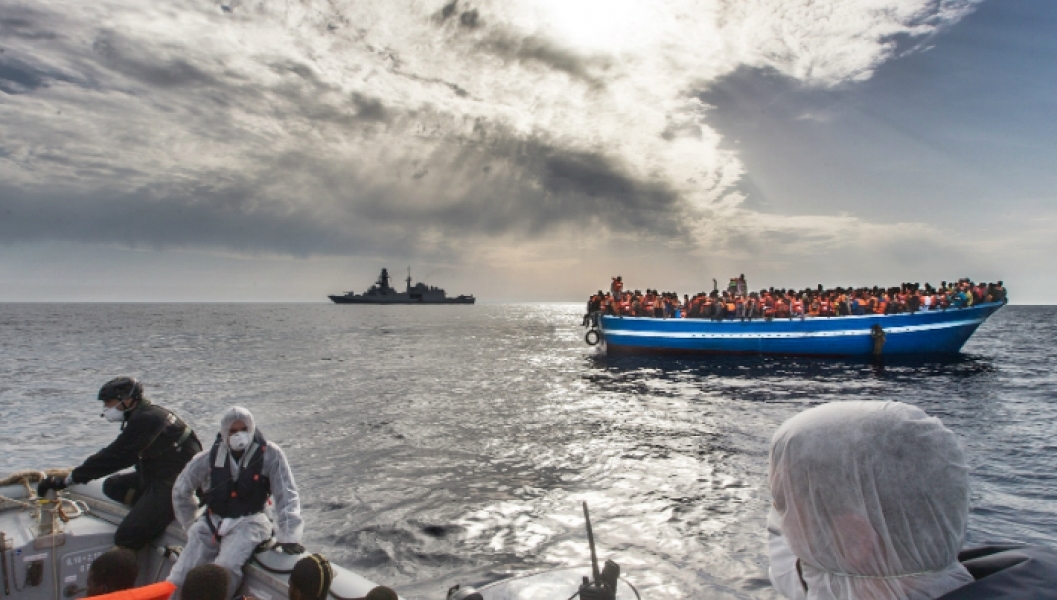The tragic procession of deaths and crushed dreams among African migrants desperate to reach Europe continues with no end in sight. In the first six months of 2022, nearly 1,000 migrants died trying to reach Spain’s Canary Islands, and the ghastly tally grew by three this week, as a trio of migrants from Morocco died in yet another failed crossing. More to the east, 15 migrants were found dead this month on the Libyan Sudanese border at the start of an ill-fated journey towards Europe.
But as the endless drama of African migration goes on, attention is focused almost exclusively on interdiction and rescue operations in the Mediterranean. Common will and long-term vision from the international community, especially from Europeans, is largely absent as the causes of illegal migration go unaddressed.
The European Union has opted to view the issue primarily from a security perspective. Using the economic and political vulnerability of Maghreb states to ensure cooperation, the EU has enshrined migratory restrictions in bilateral agreements in North Africa. But these restrictive provisions have only rendered migration more dangerous– and more lucrative for traffickers – without stemming the tide.
As European and North African nations ratcheted up security pressures in the eastern and central Mediterranean, migration flows shifted westward. Statistics show that nearly 18,000 migrants entered Europe from Morocco through Spain in the first half of 2021, compared to 14,000 through the central Mediterranean route.
Following heightened Moroccan-Spanish restrictions, two thirds of African migrants entering Spain now opt for the Canaries – despite the risks.
Amid the endless migration flow, Europeans have lost credibility as they looked for quick fixes, such as seeking to externalize the fight against illegal migration by setting up “disembarkation platforms” to provide migrant screening centers on North African shores.
Some European countries, particularly Italy, did not hesitate to negotiate deals with militias and traffickers to stem illegal migration. More than $500 million in EU funding has been allocated since 2015 to questionable anti-migration operations by Libya’s coast guard and unruly militias.
Missing the big picture hobbled the West’s fight against terror in the Sahel the same way it is hindering the fight against illegal migration.Â
And yet, security-related issues are only the consequence of a multitude of factors. Climate change, manifested by water scarcity and ecosystem degradation, looms large over the continent, sparking hunger and displacement. The World Bank predicts there will be 86 million “climate change migrants” in Africa by 2050.Â
Unchecked demographic growth, weak governance, and autocratic impulses on top of insurgencies and political instability are only making matters worse.
The search for lasting solutions to illegal migration should start with a Western refocus away from the disproportionate emphasis on competition with Russia and China, so as to view the Maghreb and Africa on their own terms.
Dealing with the core issues which the continent faces should mean long-term commitment to development efforts that breed hope among younger generations and convince them that they have a future at home. Substantial funds will be needed to shore up failing economies – and not just budgets to finance border control operations.
The EU, fully consumed by the Ukraine conflict, is looking eastward and pledging billions of euros for post-war reconstruction. It has no plan to prevent state failure and escalation of crises south of the Mediterranean. Mere talk of a Marshal Plan for Tunisia, the Maghreb, or Africa has ceased entirely.
Part of the responsibility for the current situation lies, however, with Maghreb countries themselves.Â
Unfortunately, they have been too divided to come up with common strategies or even to coordinate migration policies. While Algeria pursued a tough approach toward illegal migration, including summary deportations, Morocco has used migration to burnish its credentials since rejoining the African Union. For example, the kingdom regularized the status of about 50,000 Sub-Saharan migrants since 2013 and hosts nearly 12,000 African students.
Tunisia, meanwhile, has tried to accommodate European pressures for interception and repatriation, and managed the issue in an ad hoc fashion, while African migrants in Libya have remained part of a chaotic and violent landscape.Â
Change will probably have to wait for better days in the Maghreb, which would especially include the resolution of the Sahara conflict.
Mutual suspicion was evidenced after the tragic episode in June, when some 2,000 migrants attempted to climb a fence in the Spanish controlled enclave of Melilla on the Spanish border. At least 23 migrants died. Some in Morocco pointed the finger at Algeria, accusing its leaders of instrumentalizing the migration issue for the purpose of “exerting pressure on Morocco and Spain.“
Considering the level of migratory pressure on the Spanish-Moroccan border, tragedy is bound to happen again. Many in Morocco believe a more dependable approach would be for Spain to allocate more aid and encourage investments in Morocco’s border regions, which might curtail contraband and the entanglements of the informal economy.Â
North African countries are now looking at the prospect of morphing from transit to host countries. A complicating factor, however, is North African societies’ ambivalence toward Sub-Saharan migrants. Stereotypes have too often bred fear and racist reflexes, despite official pronouncements about common destiny and humanitarian obligations.Â
Considering its own demographic trends, Europe could loosen its restrictions on orderly migration beyond its selective effort to draw thousands of medical doctors and engineers from the Maghreb and other parts of Africa.
Leaving the issue of illegal migration to border patrols is both short sighted and doomed to failure.
Syndication Bureau___________________
Oussama Romdhani is the editor of The Arab Weekly. He previously served in the Tunisian government and as a diplomat in Washington.






